Originally published as Down Syndrome Program Reflects Transition Effort by Kara Baskin in Mass General Magazine
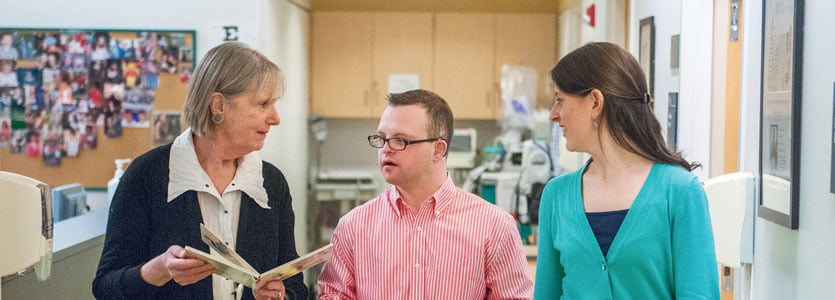
At the MassGeneral Hospital for Children (MGHfC), Ben Majewski opens the door to the waiting room at the Down Syndrome Adolescent & Young Adult Clinic. “Stacy?” he grins, greeting a teenage patient. He ushers Stacy and her family into a treatment room with plans to return shortly for more discussion.
“Hey, Ben!” calls a nurse. Mr. Majewski waves, then settles into an office to strategize his appointment. On his iPad, he pulls up talking points related to the patient’s concerns. He might even show off a recent interview he did with WCVB-TV’s “Chronicle.”
Mr. Majewski isn’t a doctor. The 24-year-old, who has Down syndrome, is a resource specialist with the clinic, which helps patients aged 13 to 21 years transition from pediatric to adult care. The clinic, housed within the MGHfC Division of Genetics, also works with patients on achieving milestones such as independent living and offers family support on topics like healthy eating, sleeping, working and dating.
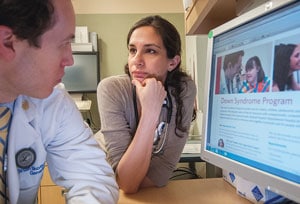
Comprehensive, Personalized Care
Mass General is known for its exemplary transition programs across many specialties. For example, the Lurie Center for Autism synthesizes medical care through a neurodevelopmental physician and helps families to coordinate benefits, guardianship, vocational services and other logistical details through a family support clinician. The Pediatric Cardiology Program has a similar interdisciplinary approach.
The goal of each program is to ensure pediatric patients move seamlessly into highly specialized adult care, with multidisciplinary treatment plans that involve medical care and real-world support. This eases the burden for families who are overwhelmed by the logistics of seeing different providers. Such a comprehensive approach helps families harness important resources without trekking from provider to provider on their own.
Peter Greenspan, MD, MGHfC medical director, believes the Down Syndrome Program exemplifies Mass General’s unique commitment to care across the lifespan. “I can’t say enough good things about the Down Syndrome Program. There’s a tremendous sense of mission and commitment for patients and their families,” he says.
“Ben treats patients like buddies in the most skillful way,” program coordinator Christianne Sharr says. “They can ask him questions they might be shy about.”
Firsthand Down Syndrome Perspective
In the Down Syndrome Program, there’s a strong sense of personalized care, too. Mr. Majewski provides a firsthand perspective for anxious families and patients who are at a pivotal point in their care. Sometimes he shares photos of his girlfriend to answer questions about dating; in another case, he recommends his favorite spots to grab gluten-free pizza for a patient with celiac disease. “Ben treats patients like buddies in the most skillful way,” program coordinator Christianne Sharr says. “They can ask him questions they might be shy about.”
Dr. Greenspan explains that transition programs promote long-term patient health as pediatric patients enter adulthood. He points to the Down Syndrome Adolescent & Young Adult Clinic as an excellent example of how Mass General tailors treatment programs to specific age groups. “This allows our providers to focus on a certain level of issues medically, psychosocially, and behaviorally,” Dr. Greenspan says. “People feel the care is individualized and age-appropriate.”
Allie Schwartz, MD, co-director of the Down Syndrome Program, was instrumental in launching the adolescent clinic and transition program in 2012. She knew these patients needed special guidance. For a family who has a loved one with an intellectual disability, the administrative hassles of negotiating guardianship and independent living can be especially taxing for families of patients who are approaching the legal age of adulthood, Dr. Schwartz notes. She’s proud of how Mass General simplifies their lives.
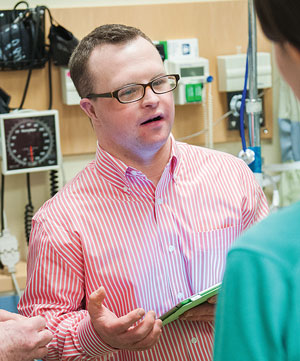
A One-Stop Shop
“This is a one-stop shop for things that would be very hard to navigate in the real world; headaches emotionally and financially,” Dr. Schwartz says. For instance, a family that wants to secure legal guardianship for their adult son or daughter with Down syndrome typically would have to see a physician, social worker and neuropsychologist in separate locations. Mass General oversees the entire process.
The clinic completes all medical testing and evaluation, then generates a “Clinical Team Report,” which is a necessary document to petition for guardianship in Massachusetts state courts. The medical team later serves as a resource as families complete the remaining steps for this process.
The attention to detail with regard to the patient’s age is also special, says Down Syndrome Program co-director Brian Skotko, MD, MPP. “Mass General is one of the only places in the United States where infants and people in old age with Down syndrome get such continuity of uninterrupted care,” he says.
Dr. Skotko’s sister has Down syndrome, so the work is deeply personal for him. “Because of her, my primary reason for going to medical school was to run a clinic like this,” he says. “I have my dream job.”
Tailoring Each Visit
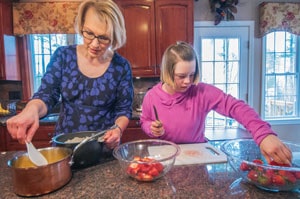
The high level of personalization is another hallmark of the transition program. Before each clinic, Drs. Skotko and Schwartz and a team of psychologists, a nutritionist, and a social worker huddle to discuss incoming patients, reviewing the highly specific intake form submitted by families in advance. The questionnaire allows the team to pinpoint areas of stress and ensures the team can tailor the visit to the needs of the patient and family.
Dr. Schwartz says this individualized approach to care sets Mass General apart from many programs and that this team approach is crucial—as are the philanthropic donations that sustain it. Many clinic positions are funded largely by donors, since insurance reimbursements only cover about a third of the cost of care.
The team sees no more than six patients per day, and each patient spends an afternoon at the hospital for a thorough check-up. Dr. Skotko asks his team to share their goals for each patient, with Mr. Majewski adding his suggestions. The patient sees a physician for 45 minutes, followed by visits with a neuropsychologist, nutritionist, social worker, Mr. Majewski, and Ms. Sharr, the program coordinator.

“Here, patients get a 360-degree wrap,” Dr. Skotko says. “We try to function as a clearinghouse for all psycho-educational and medical support.” After each appointment, detailed notes are shared with the patient’s primary care physician, something Dr. Skotko calls a uniquely symbiotic relationship. The program also refers families to specialty providers and communicates crucial medical details to these providers, many of whom are at Mass General.
Empowering the Patient
This sort of personal attention appeals to Julie Borchardt, whose teenage daughter, Noelle, has Down syndrome. “We knew before coming that Dr. Skotko was a world-famous expert, but he’s just so down to earth,” Julie says.
Mass General has been instrumental in ensuring “nothing slipped through the cracks” for the family. “Before each appointment, we fill out a questionnaire,” Julie says. “Sometimes, you wonder if anyone actually reads these things. At Mass General, doctors know our history by heart and really target what we’re worried about.”
Julie is happy that the intake form contains questions Noelle can answer and understand, so she feels like an active participant in her own care. The mother was particularly impressed by a question asking about Noelle’s goals, offering several choices instead of being phrased in an overwhelming, open-ended way.
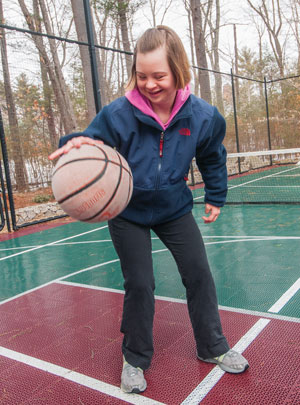
Julie is also relieved that Mass General coordinates Clinical Team Reports for the guardianship process. Usually, this form is completed separately by a physician, psychologist, and social worker. At Mass General, the transition program coordinates all signatures and shepherds the process. “We went to Mass General to make sure all our bases were covered, and the transition services have been so helpful in consolidating her care,” Julie says. “It makes things manageable.”
Soothing Their Fears
For her part, Noelle loves chatting with Ben Majewski, who helps her cope with sleep apnea, a common condition co-occurring with Down syndrome. “He showed her pictures of his CPAP [breathing] machine and how to use it,” Julie says. “It made a big impression on her.”
Back in his office, Mr. Majewski taps away on his iPad, reviewing a PowerPoint presentation he’s prepared about transitioning to independent living. Many patients are anxious about leaving home, and Mr. Majewski wants to soothe their fears. Recently, he moved into a group home with several roommates. He explains that it’s hard to do laundry or make his lunch, but he relishes the freedom—which includes his work at Mass General. He shows off a photo of his new roomies goofing off while watching TV.
“I love the excitement and energy of being here and talking to patients like me,” he says. The phone rings. Mr. Majewski is being summoned to greet another patient. Off he goes, iPad under his arm.